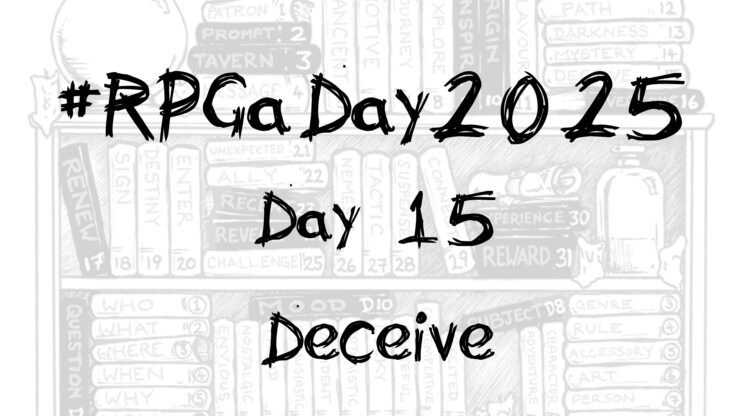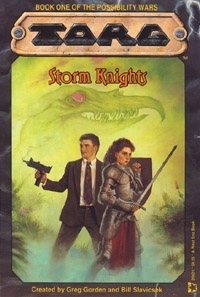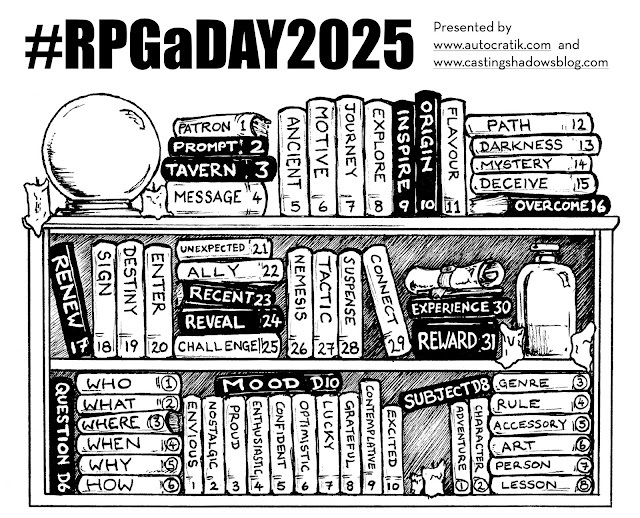Well, we’ve reached the midpoint of RPG a Day 2025. Technically, the midpoint will be noon today, but you get the idea. The topic for today is Deceive. So, when is it ok to deceive your players? Allow me to give you some context.
I love twists, and often come up with ideas for campaigns where things are not what they seem, and the conceits for the campaign get turned on their head.
I’ve done this twice before; once for a one-shot game that ended up being directly tied to our regular campaign, and another for a campaign that was a secret prequel to an established RG franchise.
The first instance was during a long-running AD&D 2nd edition homebrewed campaign. The players were about to fight with a dangerous Efreeti that guarded a powerful artifact. The session ended as the battle was about to begin, and by the time the next session rolled around, I told the players I was not ready for the adventure and the encounter, and if we could play a one-shot adventure that I wanted to try out instead. I handed out pre-made characters, and as the adventure progressed, the players started to find some odd connections between these characters, their regular characters, and the plot of the regular game. By the time they defeated the BBEG, it turned out the Efreeti had defeated them and ensorcelled them with the artifact, and the adventure they played was an illusory reality they had been living in. They defeated the enemy and the artifact, but realized they had been the Efreeti’s prisoners for months!
The other instance was a D20 Modern game where the characters worked for a secretive worldwide organization investigating strange occurrences and incursions from alternate realities. Unbeknownst to the players, this was a prequel to Torg. The campaign ended with the High Lords’ invasion of Earth. This event was a twist, but ultimately one that satisfied me more than the players, since none were big fans, or even particularly interested, in Torg.
For instance, I have a post-apocalyptic campaign idea where the players are in an isolated and remote geographic area, and they solve some challenges to their community, slowly unraveling the mysteries of what lies beyond their immediate community, only to find out their world is the Rifts campaign setting.
Other twist-based campaigns I’ve come up with include a Robotech game that is secretly, and very subtly, a mash-up with G.I. Joe and Transformers. A campaign that is a twist on the Buck Rogers XXVc game from TSR. In the near future, the characters are a military team sent to take down a Russian station in the asteroid belt that is being prepared as a mass driver cannon against their enemies. By the end of the mission, the characters end up in suspended animation, and they remain so well into the future, a variation of the Armageddon 1995 from the short story anthology, Buck Rogers, Arrival. But instead of arriving in the future of the XXVc game, the players discover Mongo has conquered the future solar system, and it becomes a Flash Gordon-inspired game.
There are a few more like that in my campaign idea list. The problem is that for these twists to work, I would have to deceive the players, lead them to expect one type of campaign, only to discover another. I can see that being fun for me as a GM, and for some players, but not so much for others. False expectations can lead to dissatisfaction, disinterest, or outright frustration.
The first instance described previously, the AD&D 2e game worked because it was a one-shot and tied to the regular campaign. The deception was minimal and ultimately had a satisfying payoff. The second instance, the Torg prequel, worked because it was a fun campaign that the players enjoyed, and ultimately introduced the game and setting to them. I wrote about the campaign in a post here in the blog back in 2010, and mentioned that one of my players remarked about the campaign that this was “the best game of Mage that was not Mage that he ever played.”
However, some of the instances outlined above would require a level of deception that could frustrate players, and I am not a fan of deceiving my friends and creating false expectations. Ultimately, I believe the twist could erode trust between the GM and the players. If I were to run any of the campaign ideas outlined above, I would be upfront and transparent about the twist, ensuring the players are informed and honest with them. No self-satisfying twist is worth deceiving my players.
Do you agree or disagree? Do you deceive your players to achieve similar twists in your games? I’d love to read about your experiences and ideas; feel free to share them in the comments or tag me wherever you share them. If you choose to join in the conversation, don’t forget to include the #RPGaDay2025 hashtag so the community can find your contribution.





